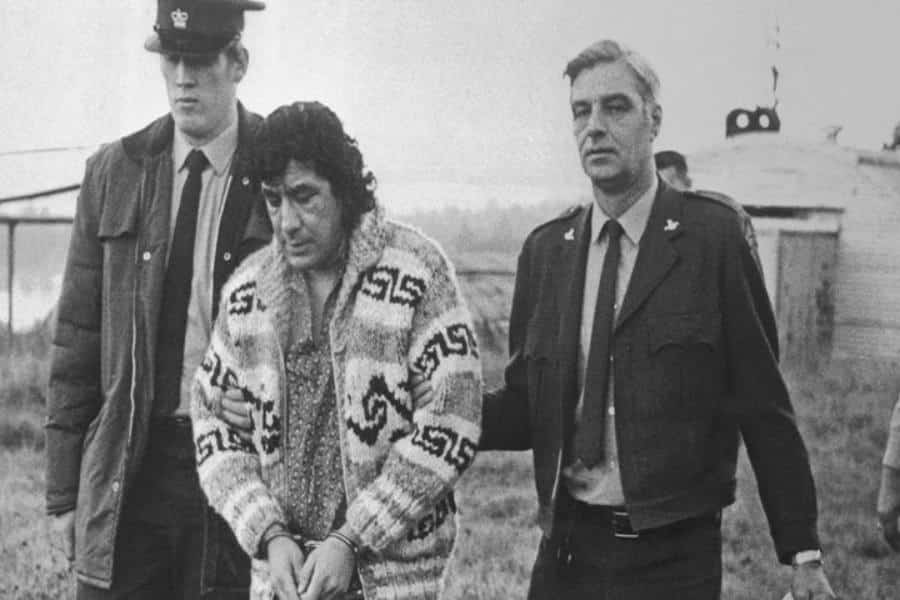
On Monday, Leonard Peltier, now 79 years old, approaches what may be his final parole hearing, a significant event that marks the latest chapter in a decades-long legal saga. Peltier’s case dates back to a tragic 1975 incident that resulted in the deaths of two FBI agents, a moment that has since ignited fierce debate and scrutiny.
Currently serving two consecutive life sentences for the killings, Peltier remains a polarizing figure, with his story encapsulating deep divides in perceptions of justice, particularly concerning Indigenous rights and law enforcement in the United States.
The hearing not only revisits the contentious details of the case but also brings to the forefront the broader implications of Peltier’s long-term imprisonment. This includes discussions around judicial fairness, racial biases, and the treatment of political dissidents within the American legal system.
Advocates for Peltier’s release, including several notable lawmakers, argue that his case is emblematic of systemic injustices that continue to plague minority communities, particularly Native Americans. Conversely, his detractors, including many within the FBI and law enforcement, view his potential release as a dangerous precedent, fearing it could undermine the gravity of crimes committed against agents in the line of duty.
As such, Peltier’s upcoming parole hearing is not merely a procedural formality but a significant societal flashpoint, reflecting enduring national debates over justice, reconciliation, and civil rights.
The Incident
The case of Leonard Peltier traces back to a tumultuous period in American history, specifically to June 26, 1975, at the Oglala Sioux Indian Reservation in Pine Ridge, South Dakota. It was here that FBI agents Ronald Williams and Jack Coler met their tragic end, fatally shot after a violent exchange. The agents were engaged in a routine operation, tracking suspects involved in a recent string of robberies, but their mission took a dire turn when they were unexpectedly ambushed.
This deadly confrontation occurred against the backdrop of heightened tensions between the U.S. government and various Indigenous movements, notably during the reassertion of Native American rights. Leonard Peltier, a prominent figure within the American Indian Movement (AIM), was quickly implicated in the double homicide. The AIM had been increasingly active in the Pine Ridge area, advocating for Indigenous sovereignty and rights, which often put its members in direct conflict with federal authorities.
Peltier’s involvement in the incident has remained a point of contention. From the outset, he has denied any direct role in the killings of Agents Williams and Coler, suggesting that his association with AIM and his presence on the reservation that day were coincidental and not incriminatory. Despite his assertions, the legal system found sufficient evidence to convict him. However, debates over his trial’s fairness and the evidence’s validity have fueled ongoing advocacy for his release.
This historical episode is symbolic of the broader struggles faced by the Native American civil rights movement, reflecting both the resistance faced by Indigenous activists and the severe repercussions often imposed on them by federal authorities. The incident on Pine Ridge did not just result in the loss of life; it also sparked a wider recognition of the complexities and challenges of reconciling government authority with Indigenous autonomy and rights.
The aftermath of the incident saw Peltier fleeing to Canada, where he was later captured and extradited to the United States. His trial and subsequent conviction in 1977 have been mired in controversy, with allegations of prosecutorial misconduct and claims of self-defense during a time of significant tension between American Indian activists and U.S. government authorities.
Support for Peltier’s release has consistently included a mix of left-wing activists and a handful of Democratic politicians, who argue that his trial was flawed and his continued imprisonment is unjust. Most recently, senators including Elizabeth Warren, Bernie Sanders, and Mazie Hirono have appealed to Attorney General Merrick Garland for a compassionate release, citing humanitarian grounds and Peltier’s status as a political symbol.
Opposition to Peltier’s parole is fierce and vocal, particularly from the FBI Agents Association, representing thousands of current and retired FBI personnel. They, along with many in the law enforcement community, view Peltier’s potential release as a betrayal of the agents’ memories and a dangerous precedent for the treatment of those convicted of killing law enforcement officers. Natalie Bara, president of the Association, emphasized that the impact of Peltier’s actions continues to resonate deeply within the FBI community and that his release would undermine the sacrifices made by agents.
FBI’s Stance and Judicial Review
FBI Director Christopher Wray has taken a firm and unequivocal position against the parole of Leonard Peltier.
Wray’s statements underscore a prevailing sentiment within the bureau, emphasizing the severity of Peltier’s actions and the consequences they believe he must continue to face. According to Wray, “Leonard Peltier intentionally murdered these two young men and has never expressed remorse for his ruthless actions.”
This perspective is rooted in a steadfast belief in the justice of Peltier’s conviction and a commitment to upholding it as a matter of principle and as a deterrent against similar crimes.
The FBI’s position is further reinforced by the extensive judicial scrutiny that Peltier’s multiple appeals have undergone over the decades.
Each judicial review has systematically reaffirmed the legitimacy of the original trial and the subsequent verdict.
This extensive legal examination, which has involved more than twenty federal judges, has consistently concluded that the evidence against Peltier remains compelling and that his conviction should stand.
These judges have scrutinized the procedural and substantive aspects of the case, assessing and often dismissing claims of judicial errors or overreach.
This rigorous judicial review process highlights the legal thoroughness with which Peltier’s appeals have been treated, serving as a cornerstone of the FBI’s argument against his release.
The bureau views the sustained upholding of Peltier’s conviction not just as a vindication of the judicial process but also as an affirmation of the importance of maintaining the integrity of law enforcement and ensuring justice for the fallen agents.
This stance reflects a broader commitment to protecting the safety and morale of current and future FBI agents by upholding the consequences faced by those who violently target law enforcement officers.
Additionally, Peltier’s actions following his conviction, including a violent escape attempt from Lompoc Penitentiary in California, where gunfire was exchanged with prison guards, have further complicated his case. These incidents are often cited by those opposing his release as evidence of his unfitness for parole.
The debate over Peltier’s imprisonment extends beyond the legal arguments and into symbolic politics, with various groups viewing his case as emblematic of broader justice and Indigenous rights issues. His supporters frame him as a political prisoner who symbolizes the struggles of Indigenous peoples against federal overreach and injustice. In contrast, his detractors see him as a clear-cut murderer who exploited political unrest for violent ends.
The parole hearing is set against historical grievances and current political tensions, making it a flashpoint for debates about justice, reconciliation, and the possibility of redemption. The hearing will determine Peltier’s fate and reflect on how American society reconciles its complex, often painful history with its ideals of justice and rehabilitation.
As the date approaches, supporters and opponents of Peltier’s parole are mobilizing to make their voices heard. This will ensure that the outcome—whatever it may be—will resonate through discussions about law enforcement, justice reform, and Indigenous rights for years to come.
Leonard Peltier’s parole hearing is more than just a legal proceeding; it is a litmus test for the American justice system’s capacity to handle cases as politically charged as they are personal. It challenges us to consider the degrees of justice and mercy that can be reconciled in a case that has divided opinions for nearly half a century.








